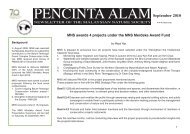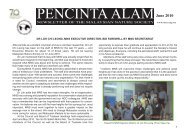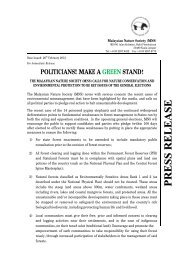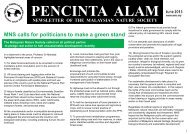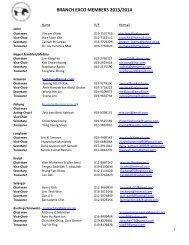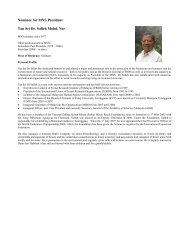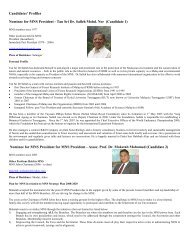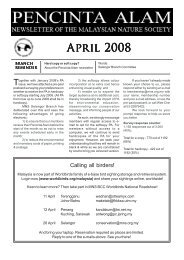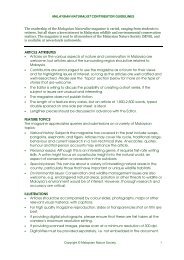PENCINTA ALAM - Malaysian Nature Society (MNS)
PENCINTA ALAM - Malaysian Nature Society (MNS)
PENCINTA ALAM - Malaysian Nature Society (MNS)
You also want an ePaper? Increase the reach of your titles
YUMPU automatically turns print PDFs into web optimized ePapers that Google loves.
Green Living ColumnComposting ConundrumsComposting has the following benefits over conventionalmeans of disposing of household and gardenwaste:1. Can be used as fertilizer and mulch to improvesoil quality;2. Reduces the volume of rubbish disposed of, andconsequently, the fuel used to transport rubbish to landfills.3. Reduces the amount of organic waste being sentto landfills, thus reducing the amount of methane generatedin landfills as a result of the decomposition of large amountsof organic matter.Here are some questions posed to Green Living bythose who have attempted household composting:Q: WHAT CAN I DO WITH MEAT, FOOD WASTEAND PET WASTE? CAN I ALSO COMPOST THESEIF I LIVE IN AN APARTMENT, OR COMPOSTUSING A BIN OR POT?The general advice is that you should not put petwaste or anything greasy, cooked or meat-based into a compostpile, unless you have a special composter (such asGreen Cone, or a compost aerator). However, these compostingdevices are expensive and not easily available inMalaysia. Furthermore, as the purpose of composting is toreduce waste, it would not make sense to increase consumptionby purchasing another product.Composting advocates and practitioners advise thefollowing steps to ensure that any organic matter that is includedin your compost pit decomposes quickly without contaminatingthe rest of the compost:i. Most wet waste such as fruit and vegetable mattershould be evenly spread out within the compost pile, skinsidedown, to ensure rapid drying. It is best to chop or breakup larger pieces.ii. Maintain a good proportion of wet waste, dry wasteand aged compost. Do not put too much wet waste in at anygiven time.iii. Expose all food waste to sunshine to speed up the decompositionprocess and to eliminate odours. To preventflies and snails, cover the wet waste with a light layer of soilor aged compost, or cover the compost pit/bin with a mosquitoscreen to keep insects out.iv. It is best not to compost fat, gristle and organs from animalcarcasses. Most worms will not aid in the decompositionof anything with oil or fat. Meat and grease also tend toattract scavenging animals and flies. All bones that are to becomposted should be thoroughly cooked and stripped freeof meat to prevent bacterial and maggot infestation. Burythe bones deep within a pocket of dry and aged compost inthe compost pile. Be prepared to take a longer time beforeyou can turn the compost.v. Composting meat and bones works best for those withlarge compost pits in landed areas, and is less suitable forthose living in apartments or composting using bins or pots.This is because microorganisms in soil will help meat andbone waste break down more easily. Also, balcony compostpots/bins may not receive sufficient heat and sunlight to killbacteria.vi. It is best to burn or char bones and meat waste to killbacteria, but it will not make sense to start the oven or grilljust to burn waste for inclusion in compost. Burn the bonesand meat in an existing fire, e.g. a barbecue pit at the end ofa party before the coals die out.vii. To be on the safe side, compost your meat/bone wastein a separate site from your existing compost pit. This is becauseif the decomposition process is not complete, therewill be highly dangerous bacteria in your meat and bonewaste that will contaminate the rest of your compost. Whenyour meat-based compost is completely dry and odourlessand there are no recognisable pieces of meat/bone scraps inthe compost, it is ready for use.viii. Pet waste can be buried in soil PROVIDED it is faraway from water sources and food plants (i.e. fruits and vegetables).Pet waste should only ever be buried near flowerbeds and non-fruit trees.ix. Most compost practitioners recommend NOT diggingup composted pet waste or meat/bone waste for use in otherareas of the garden, but to leave it in the soil where it isburied. This means that the composting was carried out to reducewaste and to improve soil quality, but is not intended tobe a method of producing compost fertiliser to be used inpotted plants or other parts of the home or garden.x. Local environments and soil quality differ, so youmight not be able to compost meat or pet waste as successfullyas your friends who live in different areas. Weather alsoplays a factor in how quickly decomposition takes place. Itis always easier more sanitary to compost in the hot season.- Wong Ee Lynngl.mnselangor@yahoo.comAngela Hijjas Interview continuesare helping the cause, and biodiversity conservationis the greatest problem facing our world. By ignoringit, we have entered a mindset that has caused allthe problems of climate change and degradation; butby participating and helping in an organization like<strong>MNS</strong> you can deal with these huge issues, knowingthat the passion is shared by others. We have to standand be counted; our electoral experience last year hasdemonstrated clearly that it makes a difference, andstanding for a voluntary position in an NGOstrengthens the organization and the chances of success;it also gives that individual an opportunity fora life changing experience that he or she would nothave otherwise. So get involved if you can, and youWILL make a difference… stand aside and you haveno right to complain. One taxi driver story I heardrefers to the national election last year: he was holdingforth on who, why and what, and that no one wasdoing what they should be doing, in his opinion. Onbeing asked "So who are you going to vote for?" hereplied, like many others, that he doesn't vote. Myfriend rightly responded by telling him he had noright to complain if he didn't even exercise that smallresponsibility, and she was right. It's up to us.8



